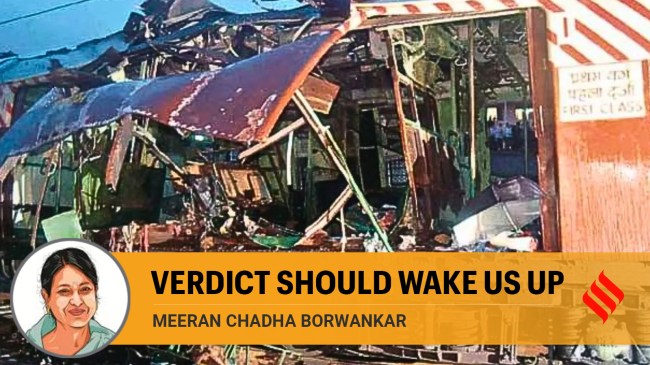Opinion In Mumbai train blast case, acquittal 19 years later raises questions about criminal justice system
If we say that 'we have a history of failure in probes in terror cases', who is to be blamed? The police alone? Let us admit that it is a collective failure, and we need to work together to streamline the criminal justice system
 The case concerns explosions on seven western suburban coaches in Mumbai, killing 189 commuters and injuring 824 on July 11, 2006. (Express Archive)
The case concerns explosions on seven western suburban coaches in Mumbai, killing 189 commuters and injuring 824 on July 11, 2006. (Express Archive) The acquittal of all the accused in the July 11, 2006 multiple train blasts in Mumbai is shocking. It is a wake-up call for all of us who have been working for a safe and secure environment in the country. That no innocent should be convicted is an often-repeated dictum, but that no terrorist or criminal should go scot-free has equal, if not more, significance. After all, who killed more than 180 innocent commuters of Mumbai and left more than 800 injured? How and why did the police and prosecution fail to get justice for the victims?
I was posted in the Crime Branch of Mumbai during those days. I remember the ghastly scenes and the utter panic with bodies strewn in railway compartments and across the tracks. The city was shaken to its core and memories of the 1993 explosions were revived. Since there were multiple blasts, various FIRs came to be registered. The Anti-Terrorism Squad of Maharashtra had recently been formed and selected officers with a flair for investigation had been picked up.
The investigation was naturally entrusted to them and they were able to successfully prosecute 12 arrested persons in the special MCOCA court in 2015. It is to be noted that more than 10 accused in the serial blasts were identified but could not be arrested. They are still absconding and could have filled the gaps about the conspiracy and its execution, while five arrested were sentenced to death and seven were given life sentences by the special court.
The High Court acquitting all of them after 10 years shows that something is terribly amiss in the criminal justice system. If they were innocent, how do we justify their incarceration for nearly 19 years? And if they were part of the terror gang responsible for the mass killing, why are they allowed to go scot-free? These questions are bound to disturb citizens who have already taken to cynicism about the working of the police and prosecution, courts and prisons. This distrust has become so rampant that it pains those of us who have worked or are still serving in government.
Once a terror incident takes place, there is immense pressure on the police for immediate detection. I had seen it happening in Mumbai in those days. Political leadership, too, gets nervous, creating further stress. Sometimes it can lead to hasty arrests and premature declarations about detection. But field-level officers are generally spared and allowed to dig deep, touch base with their informants and trace the criminal gangs or terrorists involved. In the case of the latter, we as investigators would generally come across information, including confessions of the arrested, of their having been trained in Pakistan. There were many well-trained sleeper cells going around and they were being given very specific stand-alone tasks with no sharing of information about the actual incident planned. Thus, linking of different individuals involved in the crime, delineating their specific roles, securing concrete proof about the conspiracy, collection of scientific and forensic evidence, are very tough challenges that our investigators face, working quietly behind the scenes.
I admit that some of us go wrong and there can be lacunae in the investigation. But officers working in special units like anti-terrorism squads and various crime branches work very hard to secure evidence that can withstand court scrutiny. Though police stations sometimes lack legal advice, these special units engage high-quality prosecutors to represent them. Therefore, the collapse of the case of this brutal mass murder of innocents needs deep introspection by all sections of the criminal justice system.
If we say that “we have a history of failure in probes in terror cases”, who is to be blamed? The police alone? Let us admit that it is a collective failure and we need to work together to streamline the criminal justice system.
It is time that police and special squads created to handle terror crime were not only well trained in investigation but also equipped with the latest technology. The courts are increasingly showing distrust of depositions of witnesses, most of whom are, in any case, fearful of giving evidence in such cases. And when it comes to organised crime or terror-related cases, their fear for their lives is genuine as our witness protection programme is at a very nascent stage. This is the reason the police often depend on stock witnesses.
Further, even confessions recorded by senior police officers as provided by law do not pass court scrutiny. In these circumstances, we must shift to video recording of confessions. Many state police organisations have already started doing so. Training of officers to plug the loopholes and remove the inconsistencies before submitting chargesheets and taking timely legal advice may help us avoid the future collapse of criminal trials of this grave magnitude. That a case involving multiple train blasts in 2006 sees convictions in 2015, nine years after the crime, shows deplorable delay. And that all the arrested get acquitted 19 years later proves that our system has collapsed. We cannot avoid the writing on the wall.
In today’s distressing scenario, a well-equipped National Investigation Agency (NIA) with a conviction rate of above 95 per cent is a beacon of hope. If allowed to work freely and concentrate on its original mandate, it will definitely get terrorists and those posing a threat to national security convicted. My fear is that political parties may interfere here, too, and dilute its authority. The NIA should, in fact, not only continue with its remarkable work but also train state Anti-Terrorism Squads and other specialised units.
The judgment of the Bombay High Court should be treated as a clarion call for all wings of the criminal justice system to coordinate for ensuring a high quality of investigation, prosecution and timely trials.
The writer is a retired IPS officer of Maharashtra cadre





